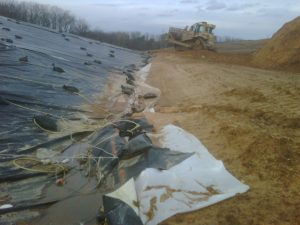Landfill Gas Testing
As the need grows for more diverse and environmentally friendly energy sources, a surprising contender has emerged as a possible solution to the problem. The conversion of landfills’ natural gas to fuel is useful, inexpensive and a healthy alternative to harmful, costly fuel sources such as oil or coal. Landfill gas (LFG) fuel is a practical and potentially lucrative resource for an industry in search of green energy alternatives. Using landfill gas as fuel could not only prove a convenient source of power but could even provide a potential fix to the problem of increasing waste production in the United States (there are now 3,091 active landfills in the US, as well as over 10,000 inactive landfills).
The Process Development Center is one of the few landfill gas testing facilities in the northeast, offering its clients cutting-edge analysis and fast results. Our laboratory is equipped with sophisticated gas chromatographs (GCs), which are capable of precisely determining the identity and quantity of each chemical component present in a sample of LFG. The PDC’s analytical laboratory can help clients meet the requirements of state Municipal Solid Waste (MSW) regulations for their landfills. Our laboratories also offer landfill gas testing to facilitate the production of fuel at LFG burning plants.
Some examples of tests that we can perform include:
- Gas Component Analysis in conformance with ASTM 1945 (methane, carbon dioxide, nitrogen, oxygen, hydrogen sulfide, GHV, relative density)
- Sulfur Analysis in conformance with ASTM 5504 (hydrogen sulfide, carbonyl sulfide, methyl mercaptan, ethyl mercaptan, dimethyl sulfide, carbon disulfide, i-Propyl mercaptan, t-Butyl mercaptan, ethyl methyl sulfide, thiophene, diethyl sulfide, dimethyl disulfide, ethyl methyl disulfide, diethyl disulfide, total sulfur)
To find out more about the PDC’s analytical capabilities, contact us.


